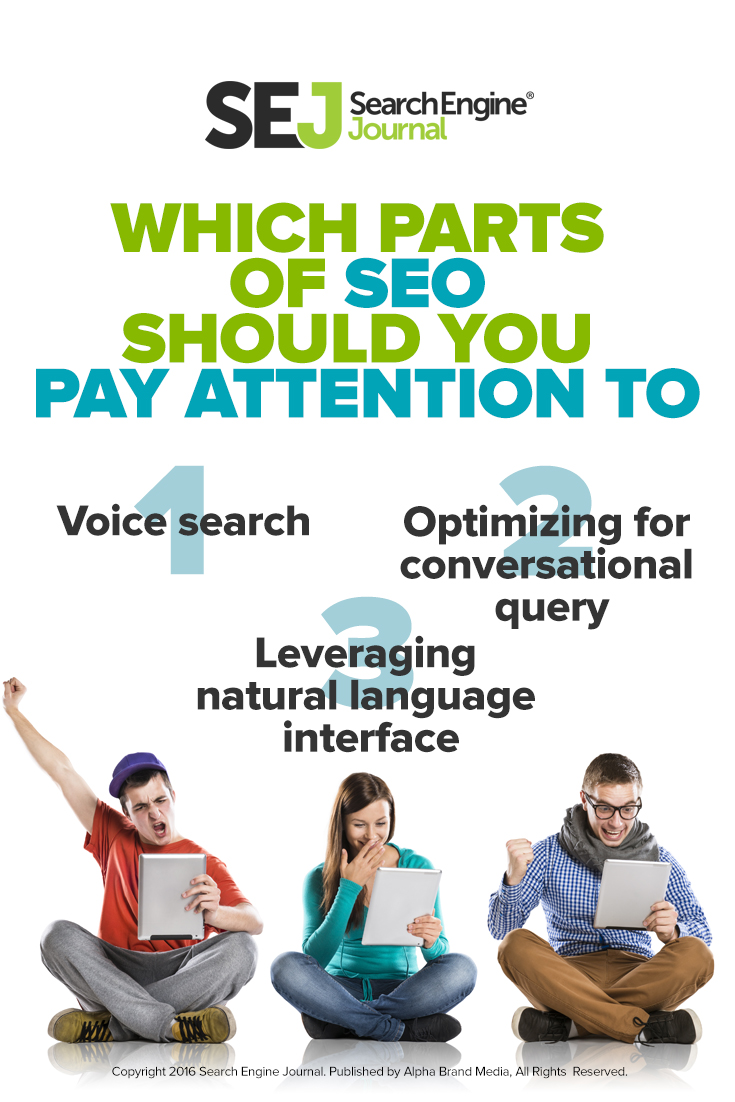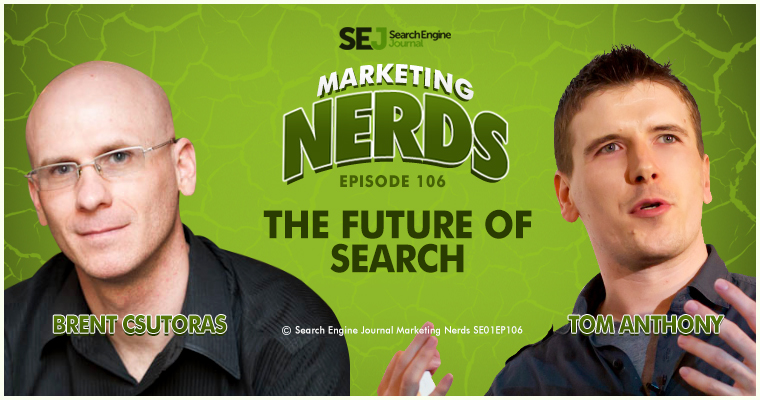Podcast: Download
Subscribe: Apple Podcast Google Podcasts Spotify
Visit our Marketing Nerds archive to listen to other Marketing Nerds podcasts!
In this Marketing Nerds episode, SEJ Chief Social Media Strategist, Brent Csutoras, was joined by Tom Anthony, Head of Research & Development at Distilled, to talk about the future of search, other technology trends, and how to put it all together to understand the main trajectories in the industry.
Here are a few excerpts from Brent and Tom’s conversation, but be sure to listen to the podcast to hear everything.
Why Thinking About the Future is Good for SEO
Thinking about the future, I just think is so important for doing good SEO. We don’t want to be doing SEO in a way that next year, we’re undoing the things that we did this year.
So, I pushed for Will and Duncan, the founders of Distilled, that we should have a department that just focuses on trying to understand the future—trying to know where is Google taking us and how we can use our understanding of that right now.
So, a large part of my role is looking at the publications that Google puts out, looking out anything they’re blogging about, the other technology trends, trying to put it all together, and thread everything together to understand the main trajectories.
It’s impossible to understand exactly where we will go, but if you understand the main direction, [it’s] surprising how often that’s helpful in setting strategies for our clients.
How Voice Search Will Affect the Future of Search
Voice is something we’ve been talking about a lot, and it’s similar to how we talked about the year of the mobile. At some point in that conversation, we surpassed the moment that we were in the year of the mobile, so it was the era of the mobile, but there was never a watershed moment.
We’ve been talking about voice search for a couple of years now. There’s not going to be a watershed moment. It’s just going to slowly increase in importance until, one day, somebody will realize how important it is.
I think in May this year, Bing said that 20% of mobile queries are now voice searches, and if you look at the fact that mobile traffic almost doubled in 2015, then you start to realize, “Okay, this is starting to become something that’s appreciably huge.”
20% of the search pie is on mobile which means it is something we should be paying attention to.
Issues in Adopting Voice Search Technology
I think there is a concern and there isn’t a concern. You got to remember that you and I are in the industry. We’re playing with technology earlier than most people are starting to use them.
By the time they start to get more mainstream, the error rate in the last two years dropped from 25% to 8% for Good voice queries. Apple has talked about similar numbers with the machine learning that they’ve been doing to understand Siri queries.
Google put a related function on Android where you can lock the phone with just your voice, so it recognizes your voice. I think we might start to see devices doing that sort of learning. Apple is doing a lot of machine learning where their learning happens on the device as part of the privacy standpoint.
How Can Marketers Pay Attention to Voice Search?
The exciting thing about voice search, from my perspective, isn’t the fact that it’s using your voice. It’s the fact that when you speak a query you naturally use natural language.
This lends itself to doing that sort of conversational query type thing, where I revise a query. So I ask a question, and then I say, “Actually, Siri, I meant this, so find me a list of recipes books. Actually, just show me the vegetarian ones.” You start getting what I call compound queries where I do a follow-up query to either revise my initial query or ask something else.
Once you have this natural language interface, you start to remove some of the barriers of having a visual interface. As soon as you have a natural language interface, and there are no visual indicators, you remove all of those barriers, and so people start doing far more complex queries than ever before.
I think that’s going to have a massive knock-on effect regarding the types of queries we see people doing, which is going to lead to us having to do SEO in a different way.
An example is something I call faceted search. At the moment, a typical e-commerce search query might be I search for fridge/freezers in Google. I get a list of ten blue links. I click on one. I go off to a website. I see a whole bunch of fridges. There, I might filter and sort those fridges, and then none of those are right. I bounce back to the search engine. I click another blue link, and I go off into another round of filtering and sorting.
What we’re going to see happen is people expect to be able to do all of that inside the search engine, so I’m going to say, “Show me a list of fridge/freezers that have a capacity of 40 liters for the freezer section or more,” and Google is going to have to be able to start answering those queries.
Making Computers Do the Work for You
That’s the terrifying, exciting future; but we’re not there yet.
It’s another one of those things. It will gradually creep up on us, and I think we’re already going to start to see the computers doing stuff for us.
We’re already starting to see that. If you look at Google inbox, 10% of the messages people send from the Google Inbox app have been written by a machine-learning app called Smart Answers that you send me an email, and it just suggests what I should reply. And 10% of the replies people are sending are being written by the algorithm, so we’re already starting to see computers doing stuff for us.
At some point down the line, it’s not even going to wait for me to say, “Yes, send that email.” It’s just going to send it for me.
I think we’ll see in the next two or three years is something that I call computational queries.
We’re going to see the computer starting to help you process a query. For example, I might say, “Find vegetarian restaurants near the city center which are well-rated and let me know which are closest.”
That search query is quite complex because it needs to know my context, it needs to know what city center am I talking about. It needs to go away and look up those vegetarian restaurants; then it needs to look up how well rated they are. It needs to understand what do I mean by well-rated, because what I mean by well-rated might be different to what you mean by well-rated, so it’s got a personalization aspect.
Then I want to know which ones are closest, so then it needs to go and look up that information based on the results of the first part of the query, but it needs to do all of that in one go, in one step, and those computational queries.
I think it’s very realistic that we will see those in the next two or three years, and those could have a dramatic impact on SEO.
Conversational Search Queries
There’s an interview that was published last year with a Google engineer. I can’t remember who it was, but he talked about exactly that scenario where you ask Google a query.
It’s probably going to be a voice query because that lends itself to this conversational approach, and it says, “Did you mean this or that?” It was trying to make sure it properly understood your intent because that’s something that has been a key goal of Google with search queries.
To listen to this Marketing Nerds Podcast with Brent Csutoras and Tom Anthony:
- Listen to the full episode at the top of this post
- Subscribe via iTunes
- Sign up on IFTTT to receive an email whenever the Marketing Nerds podcast RSS feed has a new episode
- Listen on Stitcher, Overcast, or Pocket Casts
Think you have what it takes to be a Marketing Nerd? If so, message Kelsey Jones on Twitter, or email her at kelsey [at] searchenginejournal.com.
Visit our Marketing Nerds archive to listen to other Marketing Nerds podcasts!
 Image Credits
Image Credits
Featured Image: Image by Paulo Bobita
In-post Photo: LDProd/DepositPhotos.com





